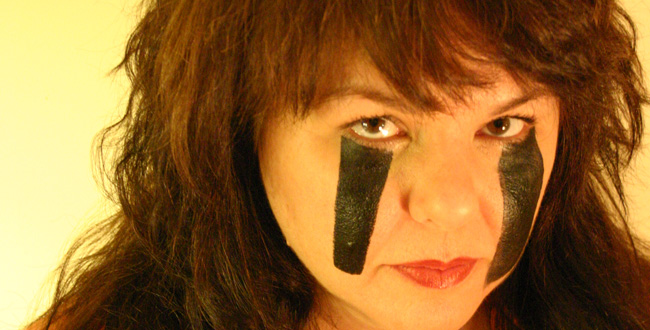OPINION: Time for Reconciliation KAIROS Gathering lacks heart

By Lynn Gehl
The Time for Reconciliation KAIROS Gathering scheduled to take place in the City of Ottawa May 29th through June 3rd, 2015 − http://www.kairoscanada.org/events/time4reconciliation/ − lacks the much needed Algonquin Anishinaabeg heart, yet we are the host in that the event is on our traditional territory. Ceremonial inclusion, while important, is not enough.
The City of Ottawa, the National Capital Region, Canada’s Parliament buildings, the Prime Minister’s residence, and the Governor General’s residence known as Rideau Hall all reside on unceded Algonquin Anishinaabeg territory. Many people know this and therefore when visitors come into Algonquin Anishinaabeg territory they acknowledge the Algonquin. In respecting who the original inhabitants of the territory are, before people speak they honour the Algonquin by saying something to the effect of: “I would like to acknowledge and say thank you to the Algonquin Anishinaabeg for taking care of this land and for allowing us to be here today”.
KAIROS, a collection of ten Christian churches and organizations, works as allies toward truth and reconciliation regarding what has happened to Indigenous people whose land Canada occupies. One of the goals of KAIROS is building right relations with Indigenous peoples.
It is said that this KAIROS reconciliation event will feature a much needed critical discussion about the very matter of reconciliation. While this may be the case, the line-up of events and speakers does not feature anyone that can speak free from colonial constraints and explicitly about what the Algonquin Anishinaabeg in Ontario are dealing with. What I mean by this is that the Algonquin Anishinaabeg in Ontario, severed as we are through colonial policy from the Algonquin Anishinaabeg in Quebec, are presently being forced to terminate our land and resource rights through unilaterally constructed federal policy rooted in the ongoing colonial agenda. This is the very land and resources required for the Algonquin to begin the process of re-building our own structures of governance such as health care and education that speaks to us and that will guide us toward a better life that all Indigenous people deserve.
Planting a Heart Garden on the Governor General’s Residence
During this event participants will plant a heart garden on the Governor General’s residence to honour all the children who died in the residential school system. While I genuinely think this is a special and meaningful ritual, on another level KAIROS is in denial of the very Indigenous Nation that resides at the heart of Canada the nation state and what they are going through. In this way this ritual disenfranchises the very grief that many Algonquin Anishinaabeg in Ontario have embodied inter-generationally.
Some people wonder why the Algonquin Nation was denied a treaty during the historic treaty process. After all, Canada’s earliest beginnings were in the heart of what was once called Upper Canada and Lower Canada, now the provinces of Ontario and Quebec, and the Algonquin Nation was one of the first recorded in Champlain’s journals. Through my work I have learned that British officials were compelled to deny the Algonquin because, as an emerging and fledgling nation state, British Canada was vulnerable. It is known that when nation states crumble it is the long-time territorial boundaries of Indigenous Nations that become the fault lines. It was not at all an oversight or administrative error that Canada denied the Algonquin. Rather, it was and remains a strategic and important element of the creation of Canada because at its heart Canada’s parliament buildings squat on traditional Algonquin Anishinaabeg territory.
Reconciliation Must Value Indigenous Knowledge and Our Ways of Knowing
The contribution of the Indigenous traditions to the knowledge arena is that knowledge must be broadly understood as more than only what is located in human consciousness, reason, and intent. Knowledge is foremost located in the practices people do and, for that matter, also includes what people feel in their hearts. Indigenous people are tired of the excuse, “it was not my (or our) intent”. This excuse is hurtful, not helpful. Indigenous people want and need concrete practices and actions of reconciliation and change.
Honouring the Algonquin Must Move Beyond Patronization
It is heartbreaking that Canada’s Prime Ministers and parliamentarians continue to engage in poor practice; both well intended or rooted in trickery. Regardless, Indigenous people are deserving of more from ally organizations and the people they employ. An Ottawa based celebratory reconciliation event that ignores the original inhabitants and the very issues they face, moves beyond what some may argue as not intended, an oversight, poor practice, or a contradiction. It is a perpetuation of colonization.
It is my genuine hope that event organizers recognize the issue I address as legitimate and as such allow the space for this important matter.
Related links:
Algonquin Anishinaabeg in Ontario
1. http://www.lynngehl.com/2-truth-that-wampum-tells.html
2. http://rabble.ca/news/2013/03/heart-break-algonquin-genocide
3. https://ricochet.media/en/318/first-nations-finance-their-own-demise-through-land-claims-process
Canada’s and the Church’s Apologies
Allyship
1. http://thefeministwire.com/2013/04/clearing-the-path-for-the-turtle/
2. http://www.lynngehl.com/gehl-ally-bill-of-responsibilities.html
Lynn Gehl, PhD is an Algonquin Anishinaabe-kwe. She has a section 15 Charter challenge regarding the continued sex discrimination in The Indian Act, is an outspoken critic of the Ontario Algonquin land claims and self-government process, and has three books titled Anishinaabeg Stories: Featuring Petroglyphs, Petrographs, and Wampum Belts, The Truth that Wampum Tells: My Debwewin on the Algonquin Land Claims Process, and Mkadengwe: Sharing Canada’s Colonial Process through Black Face Methodology. You can reach her at lynngehl@gmail.com and www.lynngehl.com
Anishinaabeg Stories: Featuring Petroglyphs, Petrographs, and Wampum Belts
http://www.lynngehl.com/1-anishinaabeg-stories.html
The Truth that Wampum Tells: My Debwewin on the Algonquin Land Claims Process
http://www.lynngehl.com/2-truth-that-wampum-tells.html
Mkadengwe: Sharing Canada’s Colonial Process through Black Face Methodology


